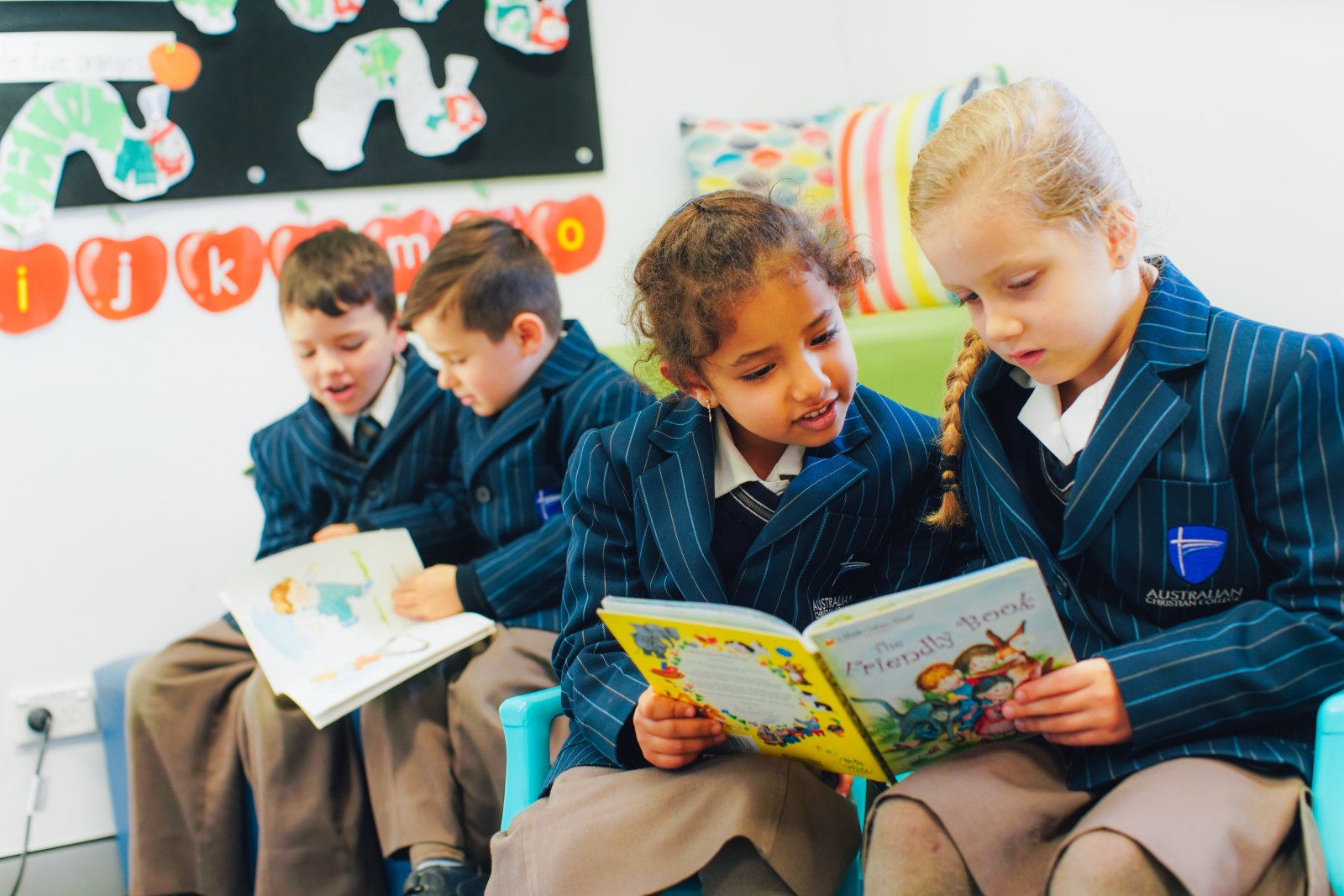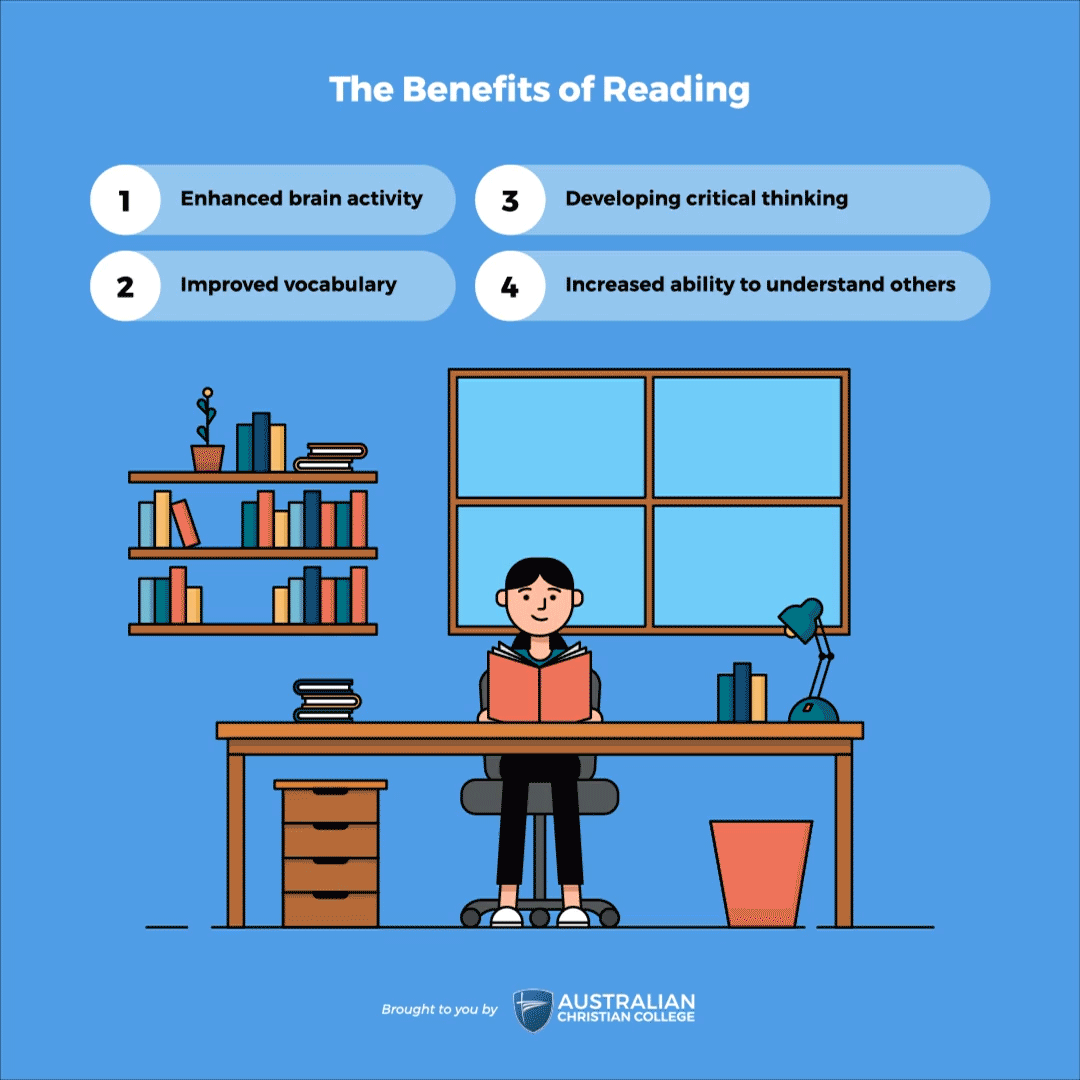Reading daily improves comprehension and student performance

Table of Contents
- What are the benefits of reading?
- Why students who read daily perform better at school
- Why some students struggle with reading
- Reading strategies which improve comprehension and literacy
- Digital reading vs hard copy
- Ideas to motivate students to read
- What is guided reading?
- How long should children read daily?
- Reading can be enjoyable
Do you have fond memories of reading with your children, or of your parents reading to you? Reading together is a wonderful way of fostering literacy in young children.
However, daily reading has benefits that go way beyond childhood. Establishing the skills needed for reading is vital for work and everyday activities such as filling out forms and following written instructions.
Helping your child to develop successful reading strategies is one of the greatest gifts you can give them. Effective reading skills give your child access to wonderful new worlds.
This article will highlight some benefits of reading, and offer practical advice to boost your child’s confidence and reading enjoyment.
What are the benefits of reading?
Aside from its necessity, reading has wide-ranging cognitive and literacy-building benefits. Here’s some of them:
1. Enhanced brain activity
Unlike watching television or streamed entertainment, reading requires focus. This engages the mind and stimulates more brain regions than passive forms of entertainment.
In a study at Emory University, for example, researchers used functional magnetic resonance imaging (fMRI) to scan the brains of students before and after reading Pompeii, a novel by Robert Harris. In the days after reading sections of the book, they found increased connectivity in the brain areas involved in receptivity for language, plus physical sensation and movement.
2. Improved vocabulary
By exposing students to new words, reading can expand vocabulary. This has been shown in research, such as this 2015 study which found that reading-related activities were the primary cause of vocabulary growth from grades four to ten.
3. Developing critical thinking
Reading widely allows students to encounter different ideas and ways of understanding the world, compelling them to consider what they believe and why. For young people with a Christian faith, whose beliefs will be challenged throughout their lives, it’s vital they learn to give reasoned arguments for their faith (1 Pet 3:15). It can be helpful for them to read the works of great Christian apologists such as Josh McDowell, CS Lewis and Dr John Lennox.
Critical thinking skills are also some of the most highly valued in the workplace, and are linked with experiencing fewer negative life events.
4. Increased ability to understand others
Encountering different ideas also helps us to understand others. Research has indicated that reading literary fiction (fiction books with literary merit) enhances what researchers call ‘Theory of Mind’, or the capacity to understand the mental state of others.
Furthermore, reading can enhance mental and emotional wellbeing. The therapeutic effect of reading is known as bibliotherapy, which is derived from two Greek words: biblion, meaning book, and therapeia or healing. This term was first used in 1914 by American minister and author Samuel Crothers, who described bibliotherapy as a “process in which specific literature, both fiction and non-fiction, was prescribed as medicine for a variety of ailments.”
More recently, research has proven the health benefits of reading, which include:
- Reduced stress – reading can lower stress by 68 percent, according to a study by the University of Sussex. They found that reading was more relaxing than listening to music, going for a walk or having a cup of tea or coffee. The results led cognitive neuropsychologist Dr David Lewis to say, "Losing yourself in a book is the ultimate relaxation … This is more than merely a distraction but an active engaging of the imagination as the words on the printed page stimulate your creativity and cause you to enter what is essentially an altered state of consciousness."
- Management of depression – a 2017 review of studies exploring bibliotherapy and depression concluded that it “appears to be effective in the reduction of adults depressive symptoms in the long-term period, providing an affordable prompt treatment that could reduce further medications.” A 2013 article exploring the effectiveness of bibliotherapy in 96 young adults with subthreshold depression found that bibliotherapy resulted in statistically and clinically significant improvements in depressive symptoms and cognition.
- Reducing memory loss – a 2013 study with almost 300 participants found that people who engaged in more cognitive activities (like reading) throughout their lives had slower late-life cognitive decline than those who did not.
Why students who read daily perform better at school
If the aforementioned benefits are not enough to convince you of the benefits of children reading regularly, research has consistently linked reading outside of school hours to improved performance across all grades. Students who read independently have greater reading comprehension, verbal fluency and general knowledge than those who do not. They become better readers, score higher on achievement tests in all subject areas, and have greater content knowledge than their non-reading peers.
This 2016 study, for example, looked at how reading for pleasure impacted academic performance across several subjects. The authors concluded that students who self-selected literature for pleasure performed better in English, Mathematics, Science, and History.
As the authors noted: “Reading helps students think critically and improves reading comprehension skills, which is beneficial in every subject area measured in this study. However, the benefits of pleasure reading do not end in the classroom. Students take the skills they have honed through reading into adulthood and, in turn, into the workforce and society.”
They pointed out that the educators interviewed as part of the study “unanimously agreed that pleasure reading was an essential component for academic and future success.''
Why some students struggle with reading
With so many cognitive and health benefits, the need to foster a reading habit is clear. But what about students who find it difficult?
Struggles with reading are common, affecting around one in five people, and are rarely a sign of low intelligence. Reading is an extremely complex task: it requires physical and cognitive strategies such as controlled eye movement, fine motor skills, phonemic awareness (awareness of sounds in spoken words), phonics (the relationship between sounds and written symbols), sustained attention, word decoding, and comprehension. A problem with just one of these strategies can impair reading development. Some children will require instruction or therapy to boost specific reading skills. Such a need should be identified by your child’s classroom teacher.
Furthermore, reading is a language-based activity and learning starts well before children enter school. Research shows that providing children with stimulating literacy experiences from birth will help them once formal schooling begins. For this reason, children raised in poverty, with limited English language proficiency, or whose parents had low reading levels are at greater risk of reading difficulties, as are children with speech, language, and hearing impairments or learning disabilities.
However, the right strategies and support give children the best opportunity for becoming proficient readers.
Reading strategies which improve comprehension and literacy
The good news is that there are numerous ways teachers and parents can support literacy and reading comprehension. The Victorian Government’s Department of Education and Training note that the main strategies viewed as supporting comprehension are:
- Activating and using prior knowledge to make connections – by tapping into their personal and cultural experiences and what they already know, readers can make connections with new material. For example, they might consider what they have previously learned about the topic or type of text. After reading, they might think about how the text added to their knowledge or influenced their thinking.
- Predicting – skilled readers anticipate the actions, ideas, events and words that might come up in a text. For example, they use cues such as a book’s title or cover picture to predict its plot or theme. Afterwards, they learn by reflecting on how accurate their predictions were.
- Visualising – this involves using the five senses to create a mental image or ‘movie’ of what is being read. For example, readers can think about the pictures, sounds, smells and tastes associated with what they read.
- Asking and answering questions – skilled readers frequently ask and answer questions of themselves before, during and after they read. For example, before reading they might wonder what the book will be about. During reading, they might question the meaning of a new word. Afterwards, they might consider the book’s main idea or seek clarification about any confusion.
- Summarising – successful readers understand the sequence of a text, put it into their own words and choose the most important ideas to sum up what an author has told them.
- Synthesising – this higher-order cognitive skill is about merging existing knowledge with new information. New knowledge might confirm what a reader already knows or challenge them to consider alternatives.
- Critical thinking – this requires the reader to consider how texts have been intentionally crafted by their author. For example, the reader might consider why an author wrote a text, what viewpoint they are supporting, what information has been left out and what the reader thinks about the topic.
There are several strategies you can use at home to help enhance your child’s reading comprehension. For example, you could try different reading materials that suit your child’s learning style, such as graphic novels, comics and audio books. This can help to build confidence in their ability.
Reading aloud also encourages fluency and phonetics, but stick with books that are at (or just above) your child’s current reading level to boost confidence. You can also read aloud together and ask your child questions to encourage thought and understanding.
Celebrate the small successes and encourage your child to persevere, even when they are frustrated.
Digital reading vs hard copy
You might be wondering whether there is a difference between reading traditional books versus on-screen. The short answer is yes. In an article in Psychology Today, paediatric neurologist Martin L. Kutscher, MD, describes four ways online reading can impede in-depth learning.
1. Screens lack the tactile experience
Research indicates the physical act of holding a book helps us to absorb the information we are reading, Dr Kutscher advises. It seems the combination of touch and sight help the brain to pay attention and more effectively assimilate what we’re reading.
2. Hypertexts and scrolling can be problematic
While they are often an important component of online articles, Kutscher notes that hypertexts can be distracting, especially when readers jump from one site to another. Furthermore, when reading a book, we have fixed cues about where we are up to in the text. For example, we have a rough idea of our place on a given page (such as the top left corner), and how far we are into a book (by the number of pages in our left versus right hands).
In contrast, screens scroll, alter text size, present pop-up ads and more, all of which make it harder to form a reliable visualisation of what we’re reading and relocate where we were up to on-screen.
3. It can encourage shallow reading
Whereas a book is a complete package, reading online can lead to skipping from one subject to another, skimming through sites seeking the next exciting morsel of information. Kutscher notes that an average webpage holds the reader for 18 seconds.
He adds that this “may interfere with the development of deep reading skills such as thoughtful pondering, critical analysis and inferential thinking,'' because the brain connections needed for deep reading (such as those involved in visual and phonological processing) may not be formed in people who learn mainly by shallow reading.
4. Distractions are readily available
On Internet-enabled devices, distractions such as video games and social media are right there. Kutscher notes that 90 percent of students felt they were more likely to be multitasking while reading online, compared to only 1 percent for reading a hardcopy document.
While there are clear benefits for reading hardcopy books, children should balance this with reading from screens. In other words, it is not one or the other, but a balance between hardcopy and screen.
Ideas to motivate students to read
By now I suspect - even hope - you have no doubt that reading books is important. Fortunately, research shows there are numerous ways you can motivate your child’s reading habits. One of these is the value students place on reading, so simply teaching them about its benefits can help. Plus, reading aloud to young children can promote understanding and interpretation of text and help them to develop the strategies needed for reading independently.
This article by Teachhub.com lists ten motivation-boosting strategies, including several you can use at home:
- Lead by example – let your children see you read. Discuss what you’re reading with them, what you’re learning and describe why you love reading.
- Allow them to choose their own books – research indicates this boosts motivation and reading skills. Your local library will have an abundance of age-appropriate books across different genres to choose from.
- Introduce them to a book series – once they’ve found a series they like, they’ll be hooked!
- Join (or set up) a reading club or book group – whether online or in person, interacting with others makes reading more enjoyable and can enhance comprehension skills.
While it remains a subject of debate, there is some evidence that carefully chosen rewards may enhance reading motivation. Apply parental wisdom as you seek to provide some just rewards for your child’s reading efforts.
What is guided reading?
Another method used to foster skilled reading strategies is known as “guided reading”. In this approach, a teacher works with small groups of students to support independent reading. A text is chosen that will be easy enough for students to understand but challenging enough to stretch them slightly.
A session starts with a pre-reading discussion, which ‘primes’ students for reading the text. The teacher might briefly summarise the plot, introduce new vocabulary or literary language, or encourage students to make predictions about the story.
While the students read independently, the teacher might listen to individual students, assist with problem-solving and provide feedback to help students achieve the lesson’s aims. In the post-reading discussion, the teacher might ask students about the text, check for comprehension, or focus on other insights that have come out of observing the students’ reading efforts.
How long should children read daily?
It seems that 15 minutes per day (not including time spent reading at school) is the ‘magic number’ for reading gains. This figure comes from an analysis that compared the engaged reading time and reading scores of more than 2.2 million students.
In contrast, those who read less than five minutes per day had the lowest levels of growth, and 5–14 minutes per day still led to gains below the national average.
Students reading for just over a half-hour to an hour per day saw the greatest gains of all.
Reading can be enjoyable
Finally, while reading is a crucial life skill and delivers wide-reaching educational value to children, it doesn’t have to be boring. On the contrary, it should be fun! The ability to read opens up a lifetime of pleasure and discovery.
In this article by children’s author Jean Reagan, she suggests several novel ways to make reading more enjoyable, such as planning family outings based around what you’ve been reading (like to a museum, beach or movie), baking treats mentioned in books, and reading in different environments.
Other ideas include choosing reading materials based on your child’s interests (even if it means starting with rugby league magazines or joke books!), creating a comfortable reading space in your home, and acting out the stories you’re reading.
Whatever you choose to do, remember that your persistence will pay off. Many parents have seen youngsters who struggle with reading develop into voracious readers with postgraduate degrees. Patience and persistence are key.
If you have concerns about your child’s reading skills, their teacher is the best person to talk to. They can provide personalised advice to help your child become a successful reader.

